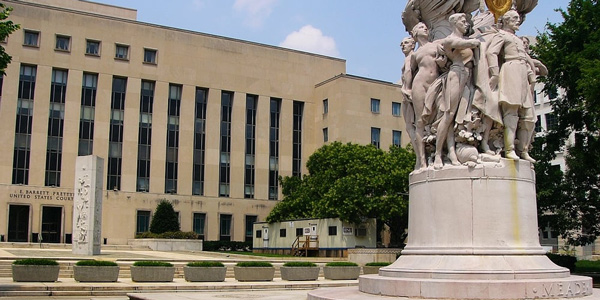FERC Chairman Neil Chatterjee last week said the commission will not petition the Supreme Court over the D.C. Circuit Court of Appeals’ ruling that its use of tolling orders violates the Natural Gas Act and Federal Power Act.
In Allegheny Defense Project v. FERC, the D.C. Circuit ruled in July that the commission could no longer grant requests for rehearing “for the limited purpose of further consideration.” The court ruled that such tolling orders improperly prevented litigants from appealing commission rulings indefinitely.
Under the NGA and FPA, requests for rehearing are automatically considered rejected if FERC does not act within 30 days of the request. Once a request is denied, the petitioner has 60 days to appeal that decision in a federal appeals court. (See D.C. Circuit Rejects FERC on Tolling Orders.)
Speaking to reporters by teleconference after FERC’s virtual open meeting Thursday, Chatterjee said the commission’s focus is on acting on rehearing requests as quickly as possible. The commission was given until Oct. 5 to decide how to respond to the D.C. Circuit’s decision after the court granted its request for a 90-day delay before issuing a mandate. (See FERC Gets More Time on Tolling Orders.)
But beginning the day after the Allegheny decision, FERC began implementing a new method for acting on rehearing requests. If the commission does not grant rehearing on the merits of the requests by the 30th day, it now issues either a notice of denial of rehearing by operation of law, signaling that it does not intend to act further, or a notice of denial and “providing for further consideration.”
Under both notices, petitioners are then free to appeal them in court. But in the latter, “after indicating that rehearing may be deemed denied by operation of law, this notice states the commission’s intention to issue a further order addressing issues raised on rehearing, citing the commission’s authority to ‘modify or set aside’ the underlying order” under the NGA and FPA, Holly Cafer, associate general counsel, told commissioners in a presentation at the meeting.
FERC is free to “modify or set aside, in whole or in part,” a prior order until the record on appeal is filed with the appellate court. When the commission does so, it will then either issue an order “modifying the discussion,” in which it provides further clarification but uphold the denial; or reverse itself and “set aside” the denial.
“Standardizing this terminology is intended to provide guidance to parties in discerning whether the commission’s order is final, such that aggrieved parties may proceed to court,” Cafer said. “We recognize that decisions regarding if or when to file a petition for review may be complex, particularly in cases where the 30-day deadline has passed and the rehearing request may be deemed denied by operation of law, but the commission, through a notice, has announced its intent to issue a further merits order. …
“The changes in commission practice discussed today, among others, are intended to allow appeals of commission orders to proceed on a complete administrative record, including a rehearing order, in a timely manner.”
FERC had regularly used tolling orders under both the NGA and FPA, but the indefinite delay of an order on rehearing was most controversial in natural gas pipeline approvals, as companies were still allowed to seize property under eminent domain and even begin construction of their projects while the commission considered requests.
The D.C. Circuit’s decision arose from the commission’s 2017 approval of Williams Companies’ Atlantic Sunrise project, an expansion of the company’s existing Transcontinental Pipeline. While the case was being litigated, Chatterjee sought to give landowners’ requests higher priority.
In September 2019, he pledged that the commission would try to rule on such requests within the 30-day deadline. In February, he announced the creation of a new rehearing section within the Office of the General Counsel to expedite action. And finally in June, the commission said it would no longer allow companies to begin construction on projects while it considered rehearing requests. (See FERC Revises Pipeline Policy on Landowner Concerns.)
But on Thursday, Chatterjee reiterated that the commission cannot prevent companies from taking property under eminent domain after it approves a project. He and Commissioner Richard Glick repeated their call on Congress to pass legislation effecting such a change, as well as giving the commission more time to act on rehearing requests.





